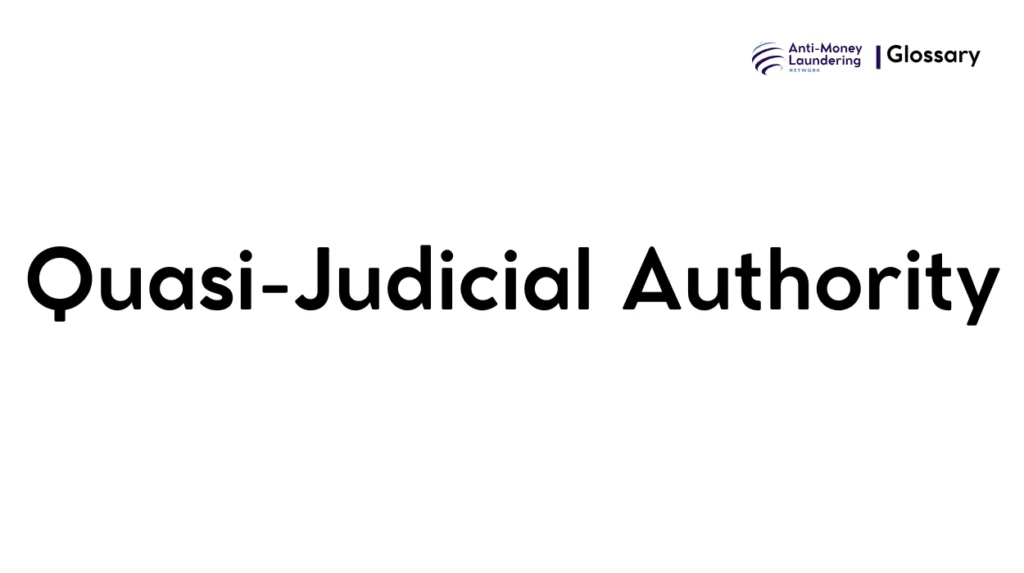Definition
Quasi-Judicial Authority in Anti-Money Laundering (AML) refers to a legally empowered administrative or regulatory body that has the authority to adjudicate AML-related matters, conduct hearings, and make decisions resembling those of a court, without being part of the judicial system. These authorities operate under statutory powers granted by AML laws and regulations to enforce compliance, adjudicate disputes, issue sanctions, and impose measures such as asset attachment or freezing related to suspected money laundering activities. They exercise decision-making powers based on existing laws while following principles of natural justice.
Purpose and Regulatory Basis
In AML, quasi-judicial authorities serve as crucial instruments for enforcement and compliance oversight. Their role includes adjudicating matters related to violations of AML regulations, handling appeals, and resolving disputes arising from regulatory actions. This authority enables regulatory bodies to act swiftly and effectively in combating money laundering and terrorist financing.
Key global regulatory frameworks supporting quasi-judicial functions include the Financial Action Task Force (FATF) Recommendations, which emphasize enforcement mechanisms and require countries to establish effective frameworks for investigation and prosecution of financial crimes. National regulations such as the USA PATRIOT Act and the European Union’s Anti-Money Laundering Directives (AMLD) empower designated bodies with quasi-judicial powers to oversee, investigate, and enforce AML compliance.
When and How it Applies
Quasi-judicial authority applies when regulatory investigations uncover potential instances of money laundering, suspicious activities, or non-compliance by financial institutions and other regulated entities. Triggering events may include:
- Filing of Suspicious Activity Reports (SARs) signaling possible illicit transactions
- Enforcement actions based on audit or regulatory inspections
- Requests for freezing or confiscation of assets linked to illicit funds
- Disputes regarding regulatory penalties or sanctions
For example, in India under the Prevention of Money Laundering Act (PMLA), the Adjudicating Authority (a quasi-judicial body) handles matters connected to attachment and retention of property suspected of being involved in money laundering. It conducts hearings, issues summons, and makes decisions on enforcement actions.
Types or Variants
Quasi-judicial authorities in AML may take various forms depending on jurisdiction and legal framework:
- Adjudicating Authorities: Specialized tribunals or panels that hear cases related to AML violations, often with expertise in law, finance, and administration.
- Enforcement Commissions: Bodies with authority to conduct investigations and issue rulings.
- Appellate Tribunals: Higher-level quasi-judicial bodies reviewing decisions made by adjudicating authorities.
- Financial Supervisory Commissions: Entities granted investigative and quasi-judicial powers for financial market oversight.
For example, India has the Adjudicating Authority under PMLA, an Appellate Tribunal, and Special Courts dedicated to AML offenses.
Procedures and Implementation
Institutions subject to quasi-judicial authority must have layered compliance systems, including:
- Robust AML policies and internal controls aligned with regulatory requirements.
- Systems for ongoing monitoring and reporting of suspicious transactions.
- Procedures to respond to notices, summons, or hearings convened by quasi-judicial authorities.
- Documentation and evidence retention to support compliance or defense.
- Legal representation and participation in quasi-judicial proceedings as required.
Implementation involves interaction with the authority during investigations, submission of required documents, and adherence to decisions, including sanctions or orders for asset freezes.
Impact on Customers/Clients
From the customer perspective, quasi-judicial authority actions may lead to:
- Restrictions or freezing of assets during investigations.
- Requests for detailed information and documentation to verify transaction legitimacy.
- Litigation or appeals in case of adverse decisions.
- Right to fair hearing and appeal under principles of natural justice.
- Possible reputational and financial impact depending on case outcomes.
Duration, Review, and Resolution
The duration of quasi-judicial proceedings varies based on complexity but typically involves:
- Initial hearings and evidence review phases.
- Opportunities for parties to present arguments and evidence.
- Decisions communicated as final orders or subject to appeal.
- Regular reviews and compliance checks post-resolution if required.
Ongoing obligations may include periodic reporting or adherence to imposed compliance measures.
Reporting and Compliance Duties
Financial institutions and regulated entities must:
- Cooperate fully with quasi-judicial investigations.
- Maintain comprehensive AML records.
- File timely reports such as SARs.
- Implement corrective actions based on authority rulings.
- Ensure staff training and awareness of quasi-judicial processes.
- Face civil or criminal penalties for non-compliance or obstruction.
Related AML Terms
Quasi-Judicial Authority relates closely to:
- Suspicious Activity Reports (SARs)
- Enforcement Directorate powers
- Adjudicating authorities under PMLA or similar laws
- Asset freezing and confiscation
- Financial Intelligence Units (FIUs)
- Regulatory compliance frameworks
Challenges and Best Practices
Challenges include:
- Complexity and length of proceedings.
- Balancing enforcement with fairness and transparency.
- Ensuring adequate institutional capacity and expertise.
- Managing cross-border cooperation and jurisdictional issues.
Best practices:
- Regular training on quasi-judicial process compliance.
- Maintaining clear documentation and audit trails.
- Early engagement with legal and compliance experts.
- Leveraging technology for monitoring and reporting.
- Ensuring internal policies reflect regulatory expectations.
Recent Developments
Recent trends involve:
- Increased digitization of proceedings with virtual hearings.
- Enhanced international cooperation mechanisms.
- Adoption of AI and analytics to support investigations.
- Regulatory updates expanding quasi-judicial powers to cover emerging financial technologies and cryptocurrencies.
- Strengthened transparency and due process requirements in various jurisdictions.
Quasi-Judicial Authority in Anti-Money Laundering represents a vital enforcement mechanism, allowing regulatory bodies to adjudicate AML matters effectively. It combines legal adjudication powers with administrative efficiency to uphold financial integrity, protect institutions and clients, and combat financial crimes. Understanding its role, procedures, and implications is essential for compliance officers and financial institutions to navigate AML regulatory landscapes successfully.

